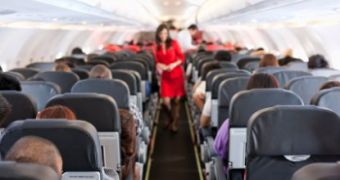The study published in The New Zealand Medical Journal stated that cabin pressure can cause a larger amount of gas than normal and that people should not refrain themselves from farting on planes as it can lead to health issues.
An area that was rather avoided until now can benefit from its own study that encourages people to just let go of their gases. Danish researchers became interested in airline flatulence after confirming the fact that pressurized cabins make people fell more gassy and, because of the tight space on planes, most people just refrain from breaking a wind out of embarrassment.
The findings showed that this kind of refraining could cause digestive problems, bloating, discomfort and stress, people being encouraged to just go for it without feeling embarrassed. The scientists suggest a few measures that could keep planes from being as smelly as it gets and propose that flatulent passengers should be identified with methane breath tests and denied entry, according to Sky News.
This option may seem a bit far-fetched as it could appear to be discriminatory and could awaken many other issues. Another option that the scientists propose is an odor-absorbing charcoal incorporated in airline seats or blankets, and of course, a lot of air-fresheners.
Another concern about farting on planes was connected to the pilot and if it is good or bad for him to just let it go. This is a bit complicated due to the fact that the smell or sound could impact the co-pilot and cause some distraction; but also if the pilot is refraining himself, he could become distracted and stressed, paying less attention to his job and more to his gassy condition.
As weird as it may seem, flight passenger flatulence is a real concern as scientists argued about the ways to approach this issue and the recommended courses of action. On 2013's bizarre studies’ list, we can also find the Italian study on how dogs wag their Tails or the Swedish research about the influences of clapping hands.

 14 DAY TRIAL //
14 DAY TRIAL //